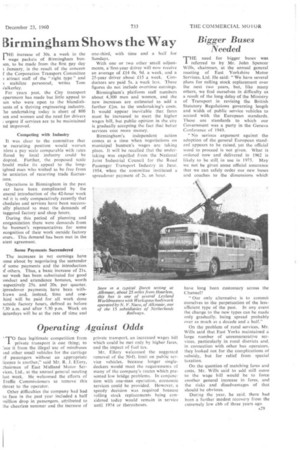Birmingham Shows the Way
Page 31

If you've noticed an error in this article please click here to report it so we can fix it.
THE increase of 30s. a week in the L wage packets of Birmingham busten, to be made from the first pay day 1 January, is the .result of the concern f the Corporation Transport Committee ) attract staff of the "right type" and ) stabilize personnel, writes Tom Valkerley.
For years past, the City transport epartment has made but little appeal to len who were open to the blandishtents of a thriving engineering industry. be undertaking today is short of 800 ten and women and the need for drivers ; urgent if services are to be maintained nd improved.
Competing with Industry
It was clear to the committee that le recruiting position would worsen nless a pay scale comparable with rates ffered by local industry could be dopted. Further, the proposed scale hould make its appeal to the longighted man who wished to be free from he anxieties of recurring trade fluctuaions, Operations in Birmingham in the past ear have been complicated by the eneral introduction of the 42-hour week nd it is only comparatively recently that chedules and services have been successully planned to meet the demands of taggered factory and shop hours.
During this period of planning and eorganization there were demands from he busmen's representatives for some ecognition of their work outside factory tours.: This demand has been met in the a test agreement.
Some Payments Surrendered.
The increases in net earnings have :ome about by negotiating the surrender if some payments and the introduction if others, Thus, a basic increase of 21s. ier week has been substituted for good :onduct and attendance bonuses, worth .espectively 25s. and 20s. per quarter. ipreadover payments have been withlrawn and, instead, time and onehird will be paid for all work done )utside factory hours, defined as before 7.30 a.m. and after 5.30 p.m. Work on iaturdays will be at the rate of time and
one-third, with time and a half for Sundays.
With one or two other small adjustments, a first-year driver will now receive an average of £14 Os. 9d. a week, and a 25-year driver about f15 a week. Conductors are paid 5s. a week less. These figures do not include overtime earnings.
Birmingham's platform staff numbers about 4,300 men and women, and the new increases are estimated to add a further fini. to the undertaking's costs. It would appear inevitable that fares must be increased to meet the higher wages bill, but public opinion in the city is gradually accepting the fact that better services cost more money.
Birmingham's independent action comes at a time when negotiations on municipal busmen's wages are taking place. It will be recalled that the undertaking was expelled from the National Joint Industrial Council for the Road Passenger Transport Industry in June. 1954, when the committee instituted a spreadover payment of 25. an hour.




























































































